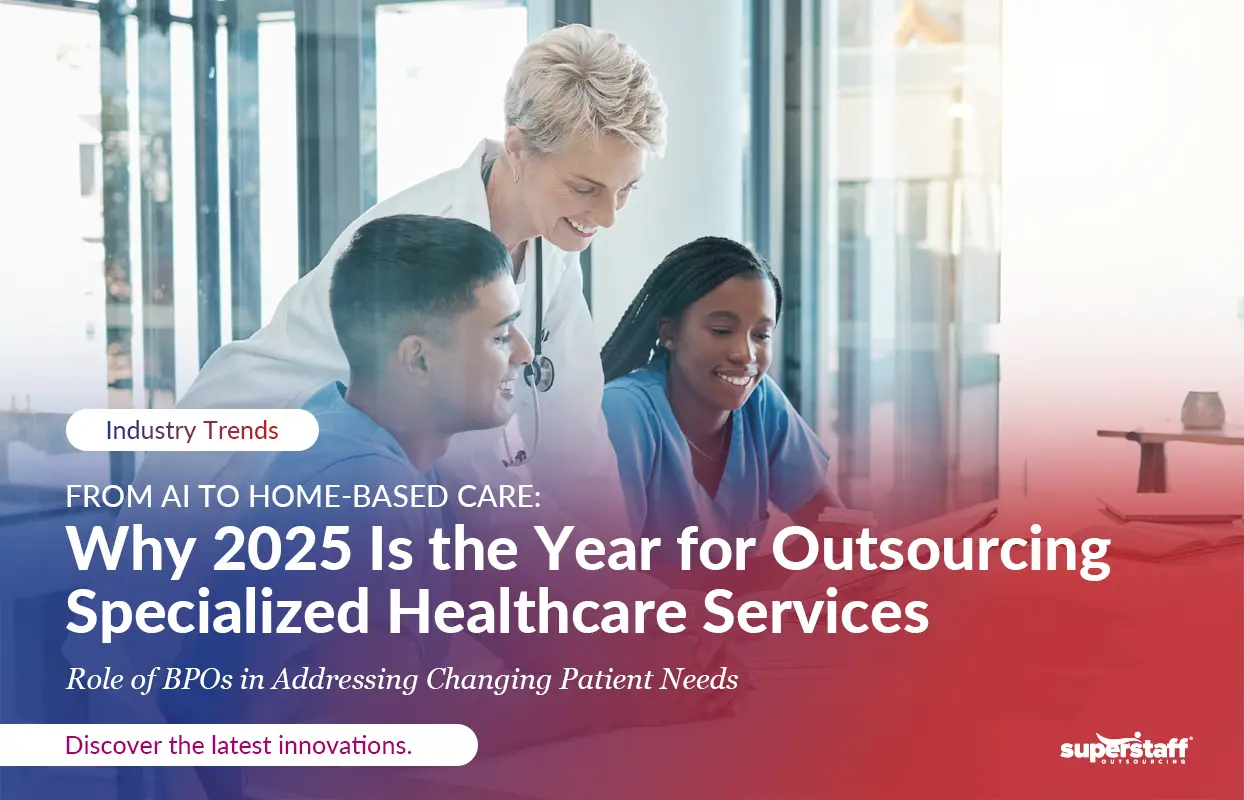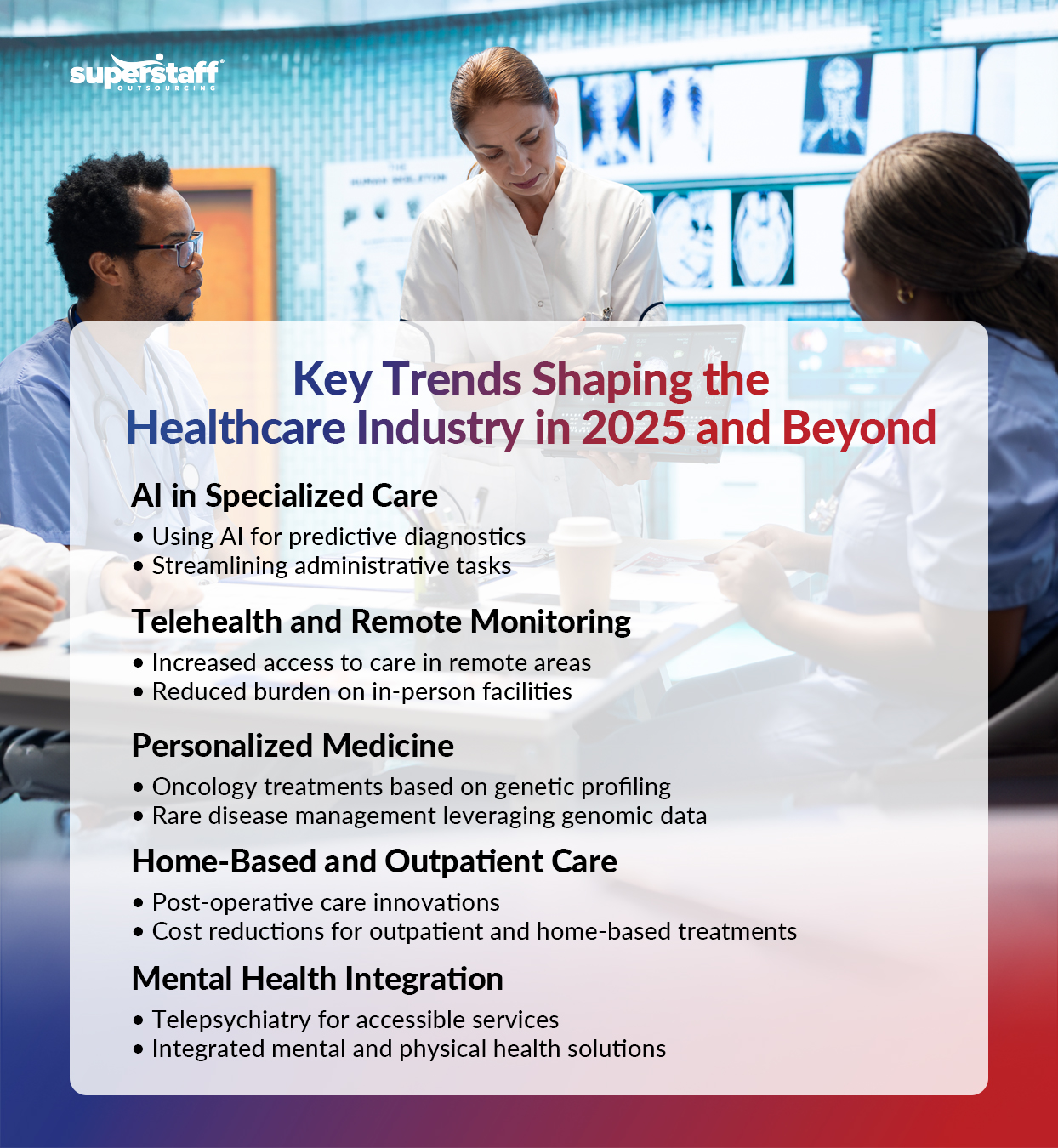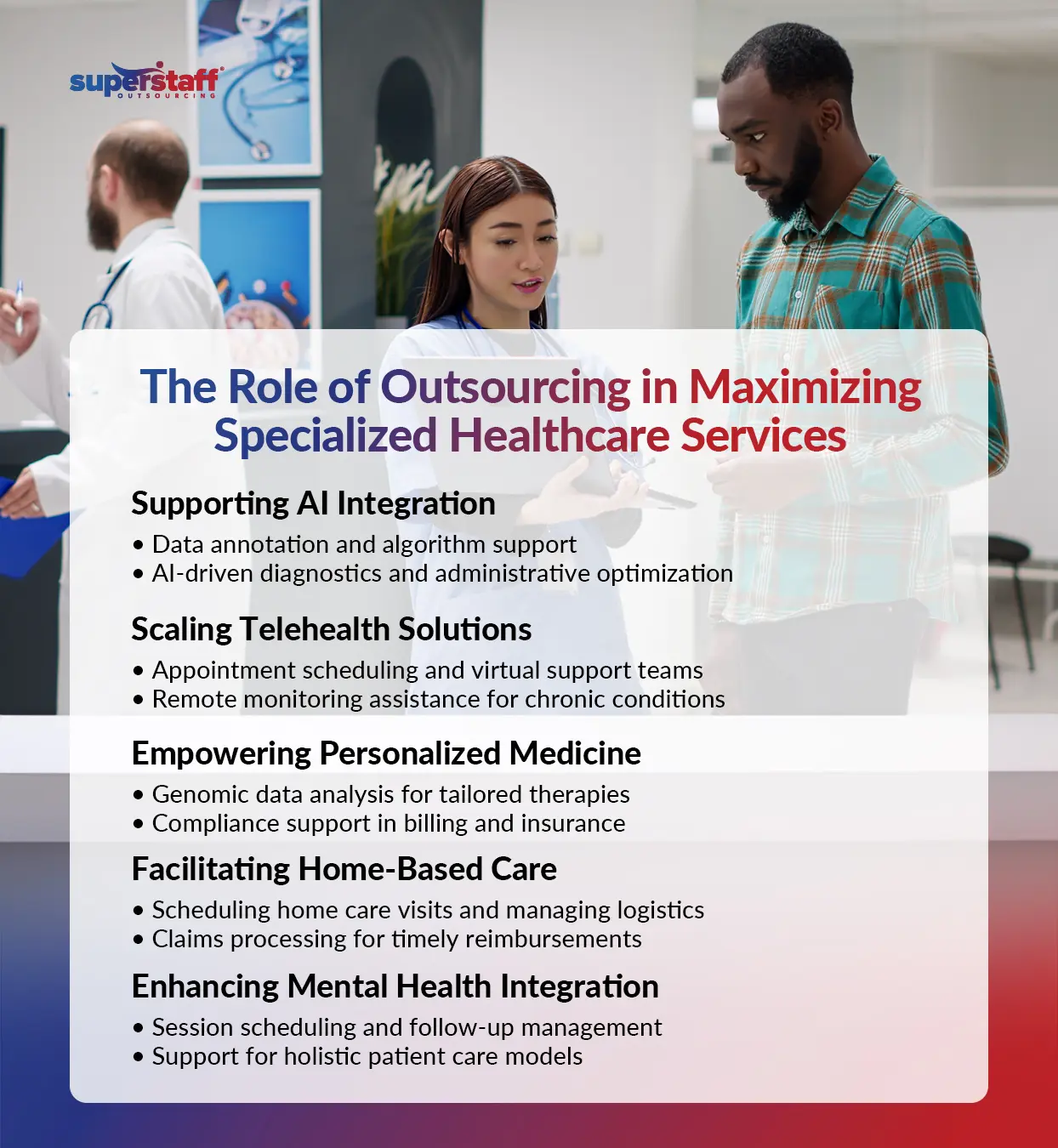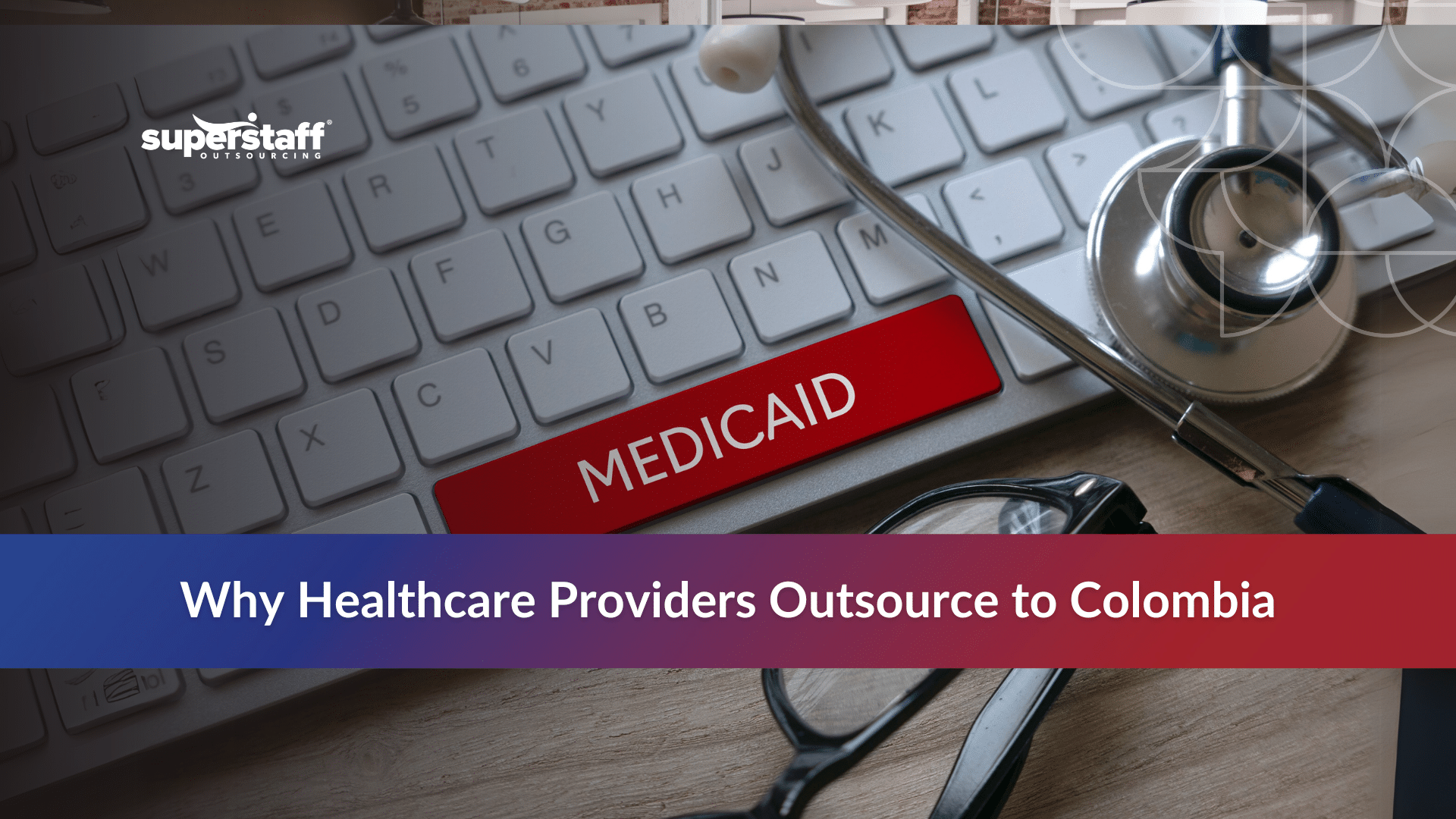
Healthcare is evolving at a pace never seen before, driven by innovation and changing patient expectations. New technologies such as artificial intelligence (AI) and remote monitoring tools are revolutionizing healthcare by optimizing processes and providing more personalized patient care.
As we move into 2025, specialized healthcare services are at the forefront of this transformation, leveraging technology, personalization, and accessibility. However, these advancements bring both opportunities and challenges, potentially disrupting many medical facilities’ existing operations.
By partnering with a specialized BPO, medical providers can navigate emerging trends, integrate innovations into their processes and workflows, and enhance patient care. This blog explores key trends shaping specialized healthcare services in 2025 and how BPOs can help providers thrive.
Key Trends Shaping Specialized Healthcare Services in 2025

Integration of Artificial Intelligence (AI) in Specialized Care
The rise of artificial intelligence has the potential to redefine how specialized care is delivered in 2025. With this new technology, healthcare facilities can fast-track research, identify medical trends that would otherwise be overlooked, give more accurate diagnoses, and create more personalized treatment plans.
From early disease detection to treatment personalization, AI enhances healthcare efficiency and accuracy. Here are just a few of the applications of artificial intelligence in the medical field:
Oncology and Cardiology Use AI for Predictive Diagnostics
Early diagnosis plays a critical role in facilitating successful medical treatments. For example, patients with cancer have a higher survival rate when the disease is detected during the early stages. Colorectal cancer has an over 90% survival rate when detected in stage one but decreases to 14% when left undiagnosed until later stages. The same is true for breast cancer.
With AI software, oncology specialists can analyze a patient’s genetic information, lifestyle, and family medical history to assess their cancer risk. They can also use AI tools to detect cancer in its early stages and create tailored therapies that address the particular patients’ unique profile.
In addition to being valuable to oncology professionals, cardiologists also see the benefits of integrating AI into their medical practice. AI and machine learning (ML) tools can be used to evaluate electrocardiogram (ECG) data to assess and diagnose cardiovascular risks. Recent studies have found that these AI and ML-based predictive models have an impressive 93% accuracy rate in diagnosing heart conditions.
Administrative Tasks Are Streamlined Through AI
Beyond assisting medical providers in facilitating early diagnoses, AI tools can also streamline and optimize critical healthcare back-office tasks. For example, many doctors record patient interactions through audio and rely on their assistants to listen to these recordings and transcribe them for the medical database.
Through business process outsourcing healthcare services, medical facilities can offload all data entry and transcription tasks to highly qualified offshore specialists. These professionals then leverage AI-driven software to turn audio and video recordings into accurately transcribed, properly formatted, well-organized text documents. This allows them to minimize transcription errors and complete tasks quicker.
Medical billing and coding is another crucial administrative function that can benefit from being streamlined by AI. Offshore specialists can use AI software to speed up billing and coding processes while retaining accuracy and precision.
Expansion of Telehealth and Remote Monitoring
While AI drives precision, accessibility to these innovations is equally vital. Telehealth is no longer a trend but a cornerstone of specialized healthcare.
Online medical consultations became prevalent during COVID-19 when clinics and hospitals were fully booked, and people were advised to stay home. In the post-pandemic era, telehealth services are here to stay, as more patients prefer receiving much-needed care and expert medical guidance in the comfort and convenience of their homes.
Beyond convenience, virtual consultations and remote patient monitoring ensure accessibility and continuous care, especially in chronic disease management. It also benefits healthcare facilities, lightening the workload of in-house medical professionals and in-person care sites.
Increased Access to Care in Remote Areas
In the past, all doctor consultations were conducted in person, which meant that people from far-flung or remote areas had to travel miles to seek needed medical care. Today, patients needing medical attention can opt for telehealth consultations, minimizing travel expenses while optimizing accessibility and convenience.
According to a 2024 Statista report, over 116 million people worldwide utilized online doctor consultations, increasing from only 57 million five years ago. Additionally, more than a third of patients preferred telehealth over in-person appointments, especially for chronic conditions. With the rise of virtual consultations, patients who once could not access medical care due to location or travel restrictions could now connect with doctors online.
Reduced Burden On In-Person Facilities
Telehealth and remote patient monitoring are helpful not only for patients but also for healthcare facilities. Since the COVID-19 pandemic, hospital emergency rooms have experienced severe overcrowding. This department handles a variety of patients with different diseases and conditions, including urgent and high-risk cases.
However, patients with non-urgent cases seeking general physicians also turn to emergency rooms, further increasing the workload of medical professionals. Thanks to telehealth solutions, people looking for general or primary care physicians can now opt for virtual consultations instead of rushing to these in-person facilities, thus allowing emergency room professionals to focus on high-risk patients.
Personalized Medicine and Genomic Integration
As telehealth grows, it also opens doors for more tailored treatments. The truth about healthcare is that multiple patients often respond differently to the same treatment, which means that the therapies that might work for one person may not be effective for another.
Thankfully, the rise of personalized medicine is making treatments more effective and patient-centric. Leveraging genomics and biotechnology, medical providers can analyze patients’ genetic information and biomarkers to create tailored treatments specifically for their needs.
Rare Disease Management Leveraging Genomic Data
Genomic profiling, also known as genomic characterization, is a procedure that uses a sample of a patient’s blood, tissue, or other bodily fluid to understand their genetic makeup. By analyzing the person’s genes or specific cell type and how those genes interact with certain therapies, medicines, or other external factors, medical professionals can better learn why some people are more prone to certain diseases, especially rare conditions.
Oncology Treatments Based on Genomic Profiling
In addition to evaluating and understanding rare diseases, genomic profiling can be helpful for oncology treatments. Medical professionals use this procedure to look for mutations or other genetic changes in the DNA of a tumor. With this innovation, doctors can test how different types of cancer form and respond to various therapies. In the future, medical specialists may also leverage genomic profiling to create new ways to diagnose and treat cancer.
Shift Towards Home-Based and Outpatient Care
Alongside personalized care, there’s also a shift in where medical interventions are delivered. Traditionally, healthcare is provided in specific facilities like clinics and hospitals. Today, specialized healthcare services are moving beyond hospital walls and into patients’ homes.
With technologies like remote patient monitoring (RPM), individuals can receive complex care in familiar environments. By leveraging health-tracking applications and wearable devices, people can collect real-time data on their heart rate, blood sugar levels, and other vital health records. They can then quickly send and share this information with their medical provider, who can provide expert guidance and advice through online consultations.
Post-Operative Care Innovations
In the past, patients recovering from surgeries relied on in-person doctor visits to track their recovery and receive necessary post-operative care. With RPM tools, post-op patients won’t need to travel to and from their local outpatient clinic. They can simply send their health data to their provider and receive the advice they need to keep their recovery on the right track.
According to a recent study on remote patient monitoring for post-op care, one of the main benefits of this innovation is that it gives patients “peace of mind” about their recovery progress. Since they can track and collect the data in real time, these patients have tangible proof that they’re getting better.
Cost Reductions for Outpatient and Home-Based Treatments
Beyond providing convenience and accessibility for patients, remote patient monitoring also benefits healthcare facilities. This transformative technology enables hospitals and clinics to reduce their medical staff’s workload and minimize healthcare costs.
According to a cost-benefit analysis from the Journal of the American Medical Association, RPM solutions created 87% fewer hospitalizations and 77% fewer deaths, leading to better patient outcomes. At the same time, remote monitoring reduced per-patient costs by $11,472. When multiplied by hundreds or thousands of patients, this helps hospitals and clinics reap significant cost savings.
Emphasis on Mental Health Integration
This greater shift to remote patient monitoring brings attention to holistic approaches in healthcare. Physical fitness was the main focus of medical interventions in the past, but in modern society, mental health is gaining recognition as a crucial component of specialized care.
Holistic care models now include access to mental health resources and behavioral assessments. In addition to caring for physical wellness through medications and lifestyle modifications, more medical providers are referring patients to critical mental health support and psychiatric therapies and interventions.
Telepsychiatry for Accessible Mental Health Services
Today, more and more patients are turning to mobile technologies when seeking needed medical care – and mental health is no exception. Instead of in-person visits, people seeking mental health support and guidance can turn to telepsychiatry for convenience and accessibility. This technology enables patients from remote areas or who may have conditions that keep them from leaving their homes to receive needed mental health treatment.
A study from the American Psychiatric Association found that no-show rates (or the number of patients who fail to show up for their scheduled psychiatric appointments) significantly decreased with the rise of telepsychiatry, which underscores how online consultations can lower the barrier to access for many mental health patients. At the same time, 90% of patients who consulted mental health specialists online said they were satisfied with the treatment they received.
Integrated Mental and Physical Health Solutions
Historically, mental health has been treated entirely separate from physical health. However, today, there is a more significant push to integrate mental health support into general medical care, especially primary care settings.
Advocates believe that bringing behavioral health clinicians into regular healthcare settings will lead to better patient outcomes by removing the stigma for seeking mental health support and improving accessibility for people of all backgrounds.
At the same time, many studies have found that mental health problems (such as depression and anxiety) can directly impact a patient’s likelihood of developing chronic conditions like heart disease, high blood pressure, diabetes, and hypertension. As such, mental health resources and support should be integrated into general medicine to aid in preventing and managing these physical ailments.
How Healthcare Business Process Outsourcing Services Can Help Facilities Adapt to Emerging Trends
Having discussed the emerging trends shaping specialized healthcare services, it’s now time to talk about how facilities can navigate these challenges while embracing the opportunities. The crucial role of outsourcing in healthcare services cannot be overlooked in this discussion.
Working with a BPO partner can enable healthcare providers to boost AI integration projects, scale telehealth solutions, empower personalized medicine, facilitate home-based care, and enhance mental health integration. Embracing these trends can help medical facilities boost patient care without disrupting existing operations, and outsourcing providers can bridge the gaps during this crucial transition period.

Supporting AI Integration Through BPOs
As AI integration becomes more widespread throughout the industry, healthcare facilities must accelerate adoption efforts to address changing patient needs and expectations. Thankfully, outsourcing specialized healthcare services can help them boost their artificial intelligence capabilities by providing skilled teams and backend expertise. Additionally, offshore and nearshore professionals can facilitate the smooth implementation and maintenance of AI tools, allowing for minimal operational disruptions.
Data Annotation and Algorithm Support
Data annotation is the backbone of artificial intelligence training, allowing AI software to read and parse through large volumes of data efficiently. However, it is also a time-consuming and highly specialized task that can take up your medical staff’s valuable work hours.
Instead of keeping this task in-house, consider outsourcing data annotation services to a BPO company. These offshore specialists can properly label audio, images, and videos so AI and ML-driven software can interpret and organize them to generate accurate medical analyses and predictions. BPO providers can also connect you with algorithm support professionals who can help train your healthcare AI model to ensure greater precision when generating content.
AI-Driven Diagnostics and Administrative Optimization
Outsourcing AI development support can help the healthcare industry unlock over $1 trillion in unrealized potential. Working with offshore specialists can help medical facilities fast-track AI projects by accessing specialized expertise, scalable solutions, and a highly trained and efficient workforce.
With help from the right specialized BPO provider, healthcare firms can leverage AI software to make accurate diagnoses. These outsourced professionals can help check and verify AI predictions to prevent potential errors in diagnostics. Your BPO partner can also connect you with healthcare back-office specialists who can help optimize your administrative support functions, enabling all other departments to maximize efficiency and productivity.
Scaling Telehealth and Remote Monitoring with BPOs
Beyond AI, BPOs also enhance telehealth operations. As mentioned previously, telehealth is no longer a product of the pandemic but a necessity and preference in the new normal. Medical facilities must allow patients to seek needed advice and assistance remotely, which can be especially critical for people from far-flung areas.
Working with a BPO partner can help healthcare providers enable the seamless scaling of telehealth and remote care initiatives. They can handle a wide range of backend and patient-facing tasks, ensuring virtual care services run without disruption.
Appointment Scheduling and Virtual Support Teams
Through healthcare customer service outsourcing, facilities can provide 24/7 virtual support for patients, addressing their inquiries, concerns, and feedback across multiple platforms. These customer service professionals can also handle appointment scheduling, allowing patients to quickly and easily book doctor consultations, laboratory work, and emergency care.
Remote Monitoring Assistance for Chronic Conditions
In addition to providing crucial patient support, outsourced teams can also offer remote monitoring assistance for chronic conditions. These offshore professionals can support doctors by reviewing collected patient data and creating comprehensive and accurate summaries and reports. They can also coordinate directly with individual patients to help them schedule telehealth sessions or in-person visits.
Empowering Personalized Medicine with BPOs
While telehealth grows, BPOs also aid in personalized medicine initiatives. With outsourced expertise on hand, healthcare facilities can strengthen and support the scalability of precision medicine programs. BPO professionals can assist medical providers by streamlining genomic data processing and customizing treatment workflows to address unique patient needs.
Genomic Data Analysis for Tailored Therapies
The right BPO provider can connect you with healthcare data analysis professionals who can review genomic data, use advanced tools and software to identify patterns in the raw information, and help you create tailored therapies for individual patients. Due to the complexity of this task, outsourced teams may also employ Quality Assurance (QA) specialists who will evaluate and verify the analysts’ suggestions, ensuring the accuracy and precision of their report and proposed therapy plan.
Compliance Support in Billing and Insurance for Personalized Treatments
Since personalized treatments will require unique medical billing and coding, employing outsourced professionals who can handle this task is necessary to ensure seamless transactions. These offshore specialists will translate all relevant medical procedures, medications, and therapies into their respective medical codes for accurate billing and insurance reimbursement.
Facilitating Home-Based and Outpatient Care
Working with outsourcing providers can improve operational efficiency for personalized medicine, and these efficiencies extend to the logistical needs of home-based care. Specialized BPOs can handle operational and administrative tasks, reducing provider workloads and enabling them to focus on providing quality patient care. At the same time, they can take care of scheduling and logistics tasks related to home-based and outpatient services.
Scheduling Home Care Visits and Managing Logistics
Proper home-based and outpatient care requires meticulous scheduling and logistics planning so medical facilities can allocate their time, resources, and workforce according to patient needs. It also ensures that all patients receive their needed outpatient therapies or consultations on time and within schedule. Through BPO logistics support, outsourcing teams can simplify coordination processes, communicating directly with patients and providers for seamless route planning and appointment scheduling.
Claims Processing for Timely Reimbursements
Patients needing regular home-based or outpatient care may usually charge their medical expenses to their insurance carrier. Outsourcing companies can offer insurance claims processing services to ensure timely reimbursements. With efficient claims processing, patients can avoid unnecessary delays to their needed medical care, and healthcare providers can receive payments on time.
Enhancing Mental Health Integration Through BPOs
Beyond general medical care, mental health initiatives also benefit from outsourcing solutions. Healthcare facilities hoping to integrate mental health into their general practice can partner with BPO providers to enhance patient support and create more holistic care models. They can assist mental health specialists with session scheduling, follow-up management, and other crucial patient support tasks.
Session Scheduling and Follow-Up Management
Patients seeking mental health services need easily accessible ways to schedule sessions with their therapist. With a BPO partner, specialized care facilities can provide critical support for these individuals, enabling them to easily book appointments or connect with their providers for follow-up management.
Support for Holistic Patient Care Models
Aside from assisting patients in booking in-person therapy appointments, BPO professionals also help scale telepsychiatry services and coordinate behavioral health resources. Leveraging remote monitoring and virtual consultation technologies, they help connect patients and providers online, allowing for a more holistic medical experience that integrates physical and mental health care.
Partner With SuperStaff for Reliable Healthcare Outsourcing Services
The rise of artificial intelligence adoption, telehealth, personalized medicine, home-based care, and mental health integration are transforming healthcare delivery. The trends shaping specialized healthcare services in 2025 demand innovative solutions, and this is where BPOs can play an active role.
With the right outsourcing partner, medical providers can embrace these new trends, maximizing the opportunities while mitigating the risks and challenges. Healthcare BPOs can help you scale your transformation initiatives, access specialized expertise, and improve operational efficiency and flexibility.






